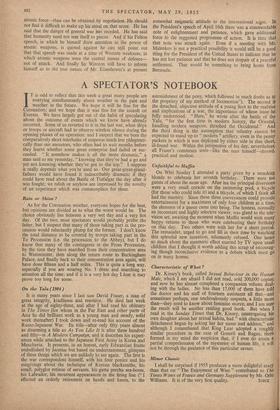On the Yalu (1904 ) It is many years since
I last saw David Fraser, a man of great integrity, kindliness and resource. He died last week at the age of eighty-three, and after I had read his obituary in The Times (for whom in the Far East and other parts of Asia he did brilliant work as a young man and steady, solid work thereafter) I took down and re-read his account of the Russo-Japanese War. Its title—after only fifty years almost as disarming a title as As You Like It is after three hundred and fifty—is A Modern Campaign, and it describes his experi- ences while attached to the Japanese First Army in Korea and Manchuria. It presents, in an honest, early Edwardian frame embellished by facetiae but based on understatement, glimpses of three things which we are unlikely to see again. The first is the war correspondent himself, with his four ponies and his misgivings about the technique of Korean blacksmiths, his small, polyglot retinue of servants, his gutta percha sea-boots, his Labrador, his recurrent appearances in the firing line ("I effected an orderly retirement on hands and knees, to the astonishment of the pony, which followed in much doubt as to the propriety of my method of locomotion"). The second is the detached, objective attitude of a young Scot to the realitieS and implications of a war, the importance of whose issue he fully understood. "Here," he wrote after the battle of the Yalu, "for the first time in modern history, the Oriental, handling modern weapons, thrashed the Occidental." And the third thing is the assumption that infantry cannot be expected to stand up to " modern " artillery, even in the penny packets in which it was deployed by either side in that short, ill-found war. Within the perspective of his day, nevertheless, all Fraser's comments were—like the man himself—shrewd, practical and modest.


































 Previous page
Previous page